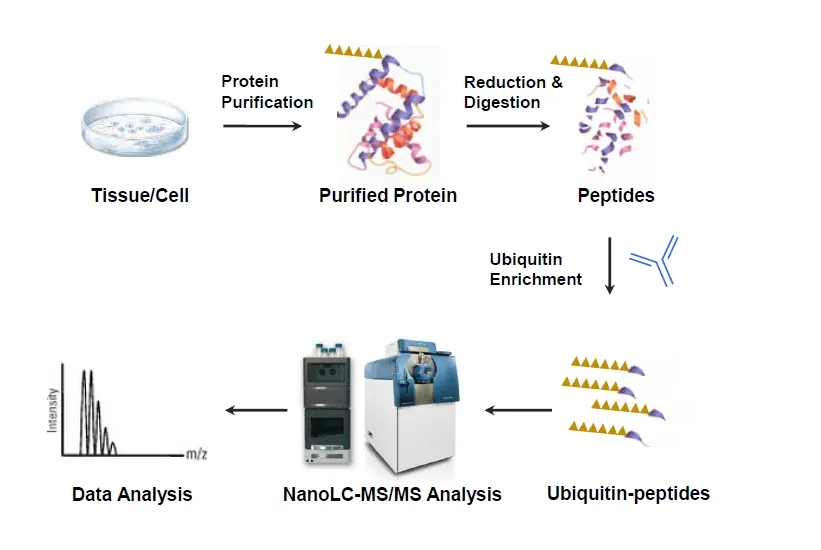Ubiquitinated Peptide Enrichment Service
Ubiquitination is a critical post-translational modification that governs essential biological processes, including protein degradation, signal transduction, and cell cycle regulation. With the advent of high-resolution mass spectrometry technologies, proteome-wide characterization of ubiquitination has emerged as a powerful approach to unravel the underlying regulatory mechanisms. Despite its significance, ubiquitinated peptides are typically of low abundance and easily masked by non-modified counterparts, making selective and high-efficiency enrichment a prerequisite for confident MS-based analysis.
To address these analytical challenges, MtoZ Biolabs offers a high-performance Ubiquitinated Peptide Enrichment Service that leverages advanced LC-MS/MS platforms and high-affinity antibodies targeting the diglycine (K-ε-GG) remnant. Combined with optimized digestion protocols and flexible analytical pipelines, our Ubiquitinated Peptide Enrichment Service enables precise identification and in-depth profiling of various ubiquitin linkage types, supporting research in cell signaling, disease biology, and drug development.
Analysis Workflow
To ensure data quality and biological relevance, our Ubiquitinated Peptide Enrichment Service follows a comprehensive and well-validated workflow:
1. Sample Lysis and Protein Extraction
Samples derived from cells or tissues are lysed in buffers containing deubiquitinase inhibitors to preserve native ubiquitination status.
2. Enzymatic Digestion and Peptide Cleanup
Proteins are digested using trypsin to generate enrichable peptides, followed by solid-phase extraction (SPE) to eliminate contaminants.
3. Enrichment of Ubiquitinated Peptides
Specific enrichment is carried out using K-ε-GG antibody-based immunoprecipitation or optimized chemical capture, selectively isolating diGly-modified peptides.
4. Nano-LC-MS/MS Analysis
Enriched peptides are analyzed on nanoflow LC systems coupled to high-resolution MS (e.g., Orbitrap Fusion Lumos) for accurate modification identification.
5. Bioinformatics Analysis and Annotation
Includes site localization, expression quantification, pathway enrichment, domain mapping, and network modeling upon request.

Why Choose MtoZ Biolabs?
Our Ubiquitinated Peptide Enrichment Service integrates multiple strengths to ensure high confidence in ubiquitin proteomics:
✅ High-Resolution MS Platform: State-of-the-art Orbitrap Fusion Lumos system provides high sensitivity and resolution for detecting low-abundance ubiquitinated peptides.
✅ Comprehensive Linkage Coverage: Compatible with multiple ubiquitin chain types (e.g., K48, K63), enabling studies across diverse ubiquitination mechanisms.
✅ Antibody-Based High-Affinity Enrichment: Utilizes K-ε-GG-specific antibodies with tiered strategies to maximize coverage and specificity of ubiquitinated peptides.
✅ Flexible Quantification Options: Supports both labeling (TMT/iTRAQ) and label-free quantification to accommodate different experimental designs.
✅ Customizable and Transparent Workflow: Adjustable workflows, clear deliverables, and transparent pricing to suit varied research goals and budget considerations.
Sample Submission Suggestions

MtoZ Biolabs accepts a wide range of sample types and provides detailed submission guidelines. Please contact our technical team for one-on-one consultation tailored to your project.
Applications
Our Ubiquitinated Peptide Enrichment Service is applicable to a wide range of biological and pharmaceutical research areas:
· Ubiquitin Signaling Pathways: Dissecting molecular mechanisms of cell cycle regulation, apoptosis, and other pathways controlled by ubiquitination.
· Disease Mechanism Exploration: Identifying aberrant ubiquitination sites implicated in cancers, neurodegenerative disorders, and immune-related diseases.
· Protein Degradation Research: Investigating ubiquitin chain recognition and trafficking mechanisms in conjunction with targeted degradation strategies like PROTAC.
· Drug Target Identification and Validation: Monitoring site-specific ubiquitination changes in response to therapeutic interventions.
· Integrative Systems Proteomics: Enhancing PTM coverage and expanding post-translational regulatory networks.
What Could be Included in the Report?
We provide a comprehensive analytical package with all necessary data and documentation for downstream use and publication:
1. Annotated list of enriched peptides and identified ubiquitination sites
2. Quantitative data (when applicable)
3. Raw LC-MS/MS spectra and identification reports
4. Optional bioinformatics analyses and pathway annotations
5. Detailed records of sample processing and enrichment protocols
MtoZ Biolabs combines technical expertise, high-performance platforms, and end-to-end workflows to support ubiquitin research across basic and translational domains. Beyond ubiquitination, our PTM services also cover phosphorylation, acetylation, SUMOylation, and other modifications. Contact us for custom solutions tailored to your research needs.
Related Services
How to order?







